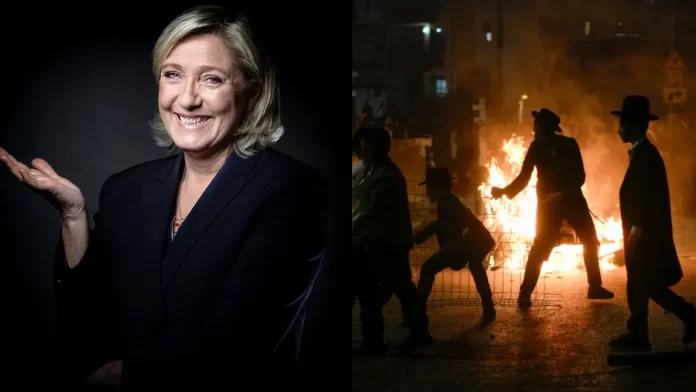PARIS – In a historic turn of events, Marine Le Pen’s far-right National Rally (RN) party has achieved significant success in the first round of France’s parliamentary elections held on Sunday, exit polls reveal. The RN is projected to have secured around 34% of the vote, marking a major setback for President Emmanuel Macron. This comes after Macron’s party suffered a defeat in the European Parliament elections earlier this month.
Thousands of demonstrators have taken to the streets across France to protest the RN’s first-round victory, chanting “No pasarán” in a show of defiance.
The exit polls, conducted by Ipsos, Ifop, OpinionWay, and Elabe, indicate that the RN has outperformed its leftist and centrist rivals. Macron’s Together alliance is estimated to have garnered between 20.5% and 23% of the vote. The New Popular Front (NFP), a newly formed left-wing coalition, is projected to have received around 29%.
While Le Pen’s supporters celebrated the results, the final outcome remains uncertain. The possibility of the RN forming a government to coexist with the pro-EU Macron hinges on the results of next Sunday’s run-off and the political negotiations that will take place in the coming days.
Le Pen’s efforts to rebrand the RN, distancing it from its history of racism and antisemitism, have resonated with voters frustrated by Macron’s policies, high living costs, and immigration issues. In Henin-Beaumont, northern France, Le Pen’s supporters waved French flags and sang the national anthem, La Marseillaise.
“The French have shown their willingness to turn the page on a contemptuous and corrosive power,” Le Pen declared to a cheering crowd.
The RN’s success in the upcoming run-off will depend on the political manoeuvres of its rivals. Historically, centre-right and centre-left parties have formed alliances to prevent the RN from gaining power, a strategy known as the “republican front.” However, this approach’s future effectiveness is uncertain.
In the French electoral system, if no candidate receives over 50% of the vote in the first round, the top two candidates and those with at least 12.5% of registered voters advance to the second round. Analysts suggest that high turnout and numerous three-way run-offs could benefit the RN more than traditional two-way contests.
Macron has urged voters to support candidates who are “clearly Republican and democratic,” excluding those from the RN and the hard-left France Unbowed (LFI) party. Leaders from the centre-left and far-left have also called for their candidates to withdraw in favour of preventing an RN victory.
Jordan Bardella, the 28-year-old RN party president, has expressed readiness to become prime minister if his party secures an absolute majority. He ruled out forming a minority government and stated his commitment to “cohabitation” with the president while implementing RN policies.
At a rally of the leftist alliance in Paris’ Republique square, the atmosphere was sombre. Najiya Khaldi, a 33-year-old teacher, voiced her “disgust, sadness, and fear” over the RN’s strong performance, seeking solace in the company of like-minded protesters.
Market reaction to the election results was subdued, with the euro experiencing a modest gain. Fiona Cincotta, a senior markets analyst at London’s City Index, noted relief that the outcome held no major surprises.
Although the RN is projected to win the most seats in the National Assembly, only one pollster, Elabe, predicts an absolute majority of 289 seats. Seat projections after the first round can be highly inaccurate, making the final results uncertain.
Voter turnout was notably high, reflecting the intense political climate stirred by Macron’s decision to call for parliamentary elections. At 1500 GMT, turnout reached nearly 60%, compared to 39.42% two years ago. Official results were expected to be announced later in the evening.



